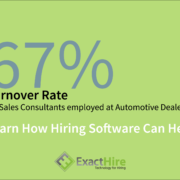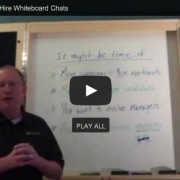What Is Good Employer Branding?
In 2021, as the pandemic continues, and the Great Resignation upends the labor market, and the reckoning with the country’s decades-long skills gap arrives, companies are pulling out all the stops to fill positions with the best talent possible. If you’re like most recruiters, you’ve researched the best jobs sites and you’re capable of writing killer job ads that get job seekers’ attention. And if you’re like the smartest recruiters, you’ve invested in an applicant tracking and onboarding system that simplifies the hiring process and lets you focus on the big picture strategies to attract high quality applicants, like good employer branding. But what is employer branding and how will an employer branding strategy help you hire the best candidates?
Why Your Employer Brand Is Important
Good employer branding in recruitment is the blueprint for attracting the attention of and creating a relationship with prospective candidates.
In the digital noise of the current post-information age, companies have to work harder to stand out. I say “post-information age” because, apparently, the experts haven’t quite figured out what to call the emerging age. The “Era of Innovation” is one contender. Then, there’s the rather pessimistic “Age of Reckoning.” Or the straightforward “Age of Automation,” as coined by a self-described former Mechanical Engineer on a Quora forum.
All of this is to say that everything is changing. Really fast. Which is why you may have had trouble figuring out how to develop your employer brand or even why you need an employer brand in the first place.
The speed at which everything is changing is also exactly why job candidates need you to have a strong employer brand. Your employer brand helps candidates know what employees can expect from your company. In the Age of—Something—candidates are looking for assurance that your company can successfully navigate current and future changes. In other words, is your company a steady ship?
That isn’t to say that your employer branding is all about easing your candidates’ anxieties. It’s actually quite the opposite. It’s about proving you’re adaptable and resilient.
It may seem like the key elements that affect an employer’s brand is a lot like your overall brand. To a degree, the character you present to your customers should extend to your employees. Also, after reading your job description, prospective candidates will familiarize themselves with your overall brand. But the benefits of employer branding will help candidates imagine whether your company will support their professional and personal goals—or not.
Assess Your Employer Brand
The importance of employer branding lies in attracting and retaining talent in the modern corporate world.
Do you have a strong Employee Value Proposition? Or is your mentality stuck in the Great Recession, when prolonged unemployment shifted power to employers?
If the employee push to remote work tells companies anything, it’s that employees want work and life balance. Today’s workforce simply isn’t willing to sacrifice their personal life for their career. Flexible schedules, remote work opportunities, and childcare stipends all help employees achieve that balance.
Are your company’s values well-defined? And do those values extend to how you treat your employees?
Your value statement probably talks about things like integrity, trust, and accountability. If your company thinks about your employees as highly as it does your customers—and it should—then those values should also apply everything from your benefits package to your discipline policy.
Is your mission inspiring? And do your new employees have an opportunity to participate in the mission so that their individual roles have meaning?
We all have a basic human need to feel like we are doing something meaningful. You can motivate even entry level employees by connecting their daily duties to the company’s overall mission.
Does your company value social justice? Do you have strong programs aimed at increasing diversity in your organization?
Candidates recognize the importance of diversity, and not just for the value it brings to marginalized groups. Companies with a diverse workforce benefit from fresh ideas and new perspectives. Prospective candidates will be looking for evidence they’ll find inclusion in your workplace.
Does your company have meaningful social responsibility initiatives?
Candidates, as well as your consumers, understand that only strong collective efforts can solve big problems, like climate change and poverty. They’re looking to support businesses committed to contributing solutions.
Make Employer Branding Important
The best employer branding ideas of 2021 start with creating a composite of your ideal candidate. You may have several ideal candidates across multiple positions and departments. But all of your profiles should have common values that drive your business’s success. You will measure employer branding strategy alongside this representation of the model candidate.
Next make an honest assessment of your current work environment. Is it the kind of place your ideal candidate would want to work? The questions in the previous section are a good place to start. But, also gather feedback from your current and former employees.
Check review sites such as Glassdoor and LinkedIn to find out what people are saying about your workplace. Consider conducting an anonymous survey of your current employees. Review your notes on exit interviews with parting employees.
Take stock of your current recruiting results. Applicant tracking software can help you gather important data, such as the most effective jobs sites for your open positions and what percentage of your new employees stick around past their first anniversary. Using assessments to quantify the strengths which make your best employees shine will help you create a recruiting strategy to attract more individuals with the same qualities.
You can begin to develop your employer branding strategies by sorting the information you gather. Make lists of what you’re doing right and what you could improve upon. Strategies for improving the employee value proposition are accessible to even small businesses.
While some important employer branding examples, such as pay and benefits, may require a sizable investment, other less-costly strategies can also pack a punch. Items such as improving your culture, creating a more equitable discipline policy or promoting from within can improve your employee retention while also attracting talent to your organization.
Employer Branding Ideas
After taking stock in what makes your company a great place to work and implementing strategies to improve shortcomings, you’re ready to create a game plan for communicating to prospective candidates the mind-blowing awesomeness that is your workplace.
Your website is fertile ground for growing your employer branding strategies. Microsoft demonstrates that they value their employees’ unique talents, even if those talents are not work-related. Their Microsoft Life page features employees’ passions outside of the office. From bakers to farmers to disability advocates, employees open up about their personal lives, which is a powerful indicator to potential applicants that Microsoft expects and encourages the kind of life balance they’re looking for.
You probably already use social media to post job openings. Go beyond job posting and news releases when developing employer branding strategies. Include photos of employees at work. Highlight the company picnic. Congratulate employees on promotions or other milestones. Share stories about causes your company supports.
Your candidate experience is an important part of your employer branding strategy. Even candidates that don’t get the job can become powerful brand ambassadors if you take steps to make their experience positive. Communicate with candidates. Let them know the next steps. Always provide a respectful review of the reasons they didn’t get the job if you decide to hire someone else. Even better, ask them for a review of their candidate experience in return.
Involve your marketing department. Employer branding ideas require quite of bit of marketing. Candidates have a wealth of information at their fingertips. The best candidates also have a wealth of options. Your marketing department can help you craft a branding strategy that gets in front of your ideal candidates while also persuading them that your company fits well with their professional and personal goals.
Employer Branding Strategy
Your marketing department will also let you in on the secret to codifying your employer brand and attracting the best talent: storytelling. When you incorporate storytelling into your employer brand, you achieve several important goals.
First, you convey a consistent message. Great stories can be summed up one sentence. Authors call this sentence the hook, and it succinctly and enticingly conveys what the book is about. As the hook relates to your employer brand strategy, it tells potential applicants what your company is about.
Take the single line at the top of Charity: Water’s branded careers site: “Quit your day job and come change the world.” That one sentence tells the story of what Charity: Water’s employees do every day. All of the copy on career’s page expounds on that story.
Storytelling has another very powerful function: it inserts the reader into the story. On Charity: Water’s careers page, applicants begin to imagine themselves joining the company on their mission to solve the water crisis.
Which brings us to the most important job of storytelling: eliciting emotion, which your marketing company would happily tell you is the key to selling. From the perspective of employer branding, eliciting emotion accomplishes another crucial task: helping candidates qualify (or disqualify) themselves from the job.
Charity: Water’s careers site tells a compelling and pointed story. Applicants can insert themselves into the story and tell right away if they want to be part of it. And if they don’t—then, the company saves themselves the expense of a bad hire because job seekers who are a poor fit move on.
Final Thoughts on Employer Branding
In the Age of—Something—recruiters have their hands full with hiring tasks. While the internet helps recruiters reach more candidates, it also makes it more difficult for companies to attract their attention. If you’re ready to take a wider perspective on recruiting to create employer branding strategies that will help you hire the best talent, an applicant tracking system can take care of the mundane details such as tracking and sorting candidates. Schedule a demo today to find out how you can free up time to create an amazing employer strategy and reduce your time-to-hire metrics.
Photo by Ian Schneider on Unsplash










